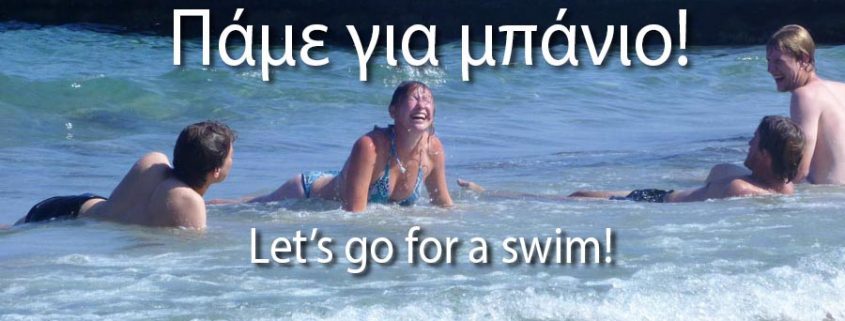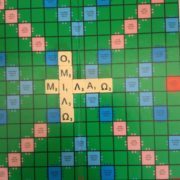Greek is not the most difficult language to learn, but also not the easiest one! The Greek language has a lot of grammar, long words, an accent on every word with more than 1 syllable, a very rich vocabulary, expressions and difficult spelling.
However, do not worry! Greeks usually understand a lot, even when you make a lot of mistakes in one sentence! So let’s look at it from the positive side, since there are also some easy things you can quickly learn and use on a daily basis.
Here below various expressions with the verb Πάω” («Pao») or “to go”, in combination with daily vocabulary.
Below you will find the video with AUDIO text, so you also can listen to the correct pronuncation.
First, it is useful to learn to conjugate the verb “to go” in the present tense…..it is not that hard!
In Greek it is not necessary to say the personal pronouns (I, you, we, etc…), you just say the verb by itself.
|
(εγώ) πάω |
(ego) pao | I go |
|
(εσύ) πας |
(esy) pas | You go |
|
(αυτός/αυτή) πάει |
(avtos/avti) paei |
He/she goes |
| (εμείς) πάμε | (emeis) pame |
We go |
| (εσείς) πάτε | (eseis) pate |
You go |
| (αυτοί) πάνε | (avtoi) pane |
They go |
So now you know to conjugate the verb, you can easily learn some expressions by adding simple daily vocabulary.
Ι. Πάω/Πάμε για… (to “go for”)
(Listen to the correct pronunciation on the AUDIO below)
1. Πάω για μπάνιο [pao gia banio] (*) I am going for a swim
2. Πάω για ύπνο [pao gia ypno] (**) I am going to sleep
3. Πάω για ψώνια [pao gia psonia] I am going for shopping
4. Πάω για καφέ [pao gia kafe] I am going for a coffee
5. Πάω για ποτό [pao yia poto] I am going for a (alcoholic) drink
6. Πάω για φαγητό [pao gia fagito] I am going to eat (out)
7. Πάω για κούρεμα [pao gia kourema] I am going for a haircut
8. Πάω για τρέξιμο [pao gia treksimo] I am going to run/ for jogging
9. Πάω για μάθημα [pao gia mathima] I am going for/to my lesson
(*) In case you really “swim a distance” (and not just sit/play in the water/sea), then you say : [pao gia kolumbi]
(**) If you have difficulties to memorize the word “ypno” (sleep), think of “hypnotize” and you will now realize how many Greek words you use in your own language!
II. Even easier, in the following sentences you do not need any preposition:
(Listen to the correct pronunciation on the AUDIO below)
Πάω σπίτι. [pao spiti] I am going home.
Πάω θέατρο. [pao theatro] I am going to the theatre.
Πάω σινεμά. [pao cinema] I am going to the cinema.
Πάω διακοπές [pao diakopes] I am going on holidays
Πάω βόλτα [pao volta] I am going for a walk/stroll
Click here on the AUDIO text to listen to the correct pronunciation of the conjugation of the verb, as well as to the sentences in I. and II. here above.
III. Let’s go for a coffee! Shall we go for a coffee?
In case you would like to say: Let’s go for a coffee, Let’s go for a drink, etc…you simply use the “we form” of the verb:
Πάμε για καφέ – “Pame gia kafe”, “Pame gia poto”, etc…
You can also change your intonation and make it a question : Πάμε για μπάνιο; “Pame gia banio?” (shall we go for a swim?)
IV. When do we go for holidays? Where do we go for holidays?
If you want to ask “when” (Πότε – pote) or “where” (Πού – pou) then just add the words in front of the sentence:
Pou pas? (Where are you going?)
Pou pame gia diakopes? (Where are we going on holidays?)
Pote pas gia fagito? (When are you going for food?)
Be careful: When you use “pote” (when), make sure the stress is on the “O”.
In case you pronounce it with the stress on the “e”, you actually say “never”.
Hope you will soon be motivated to speak Greek!
Keep it simple and enjoy.









